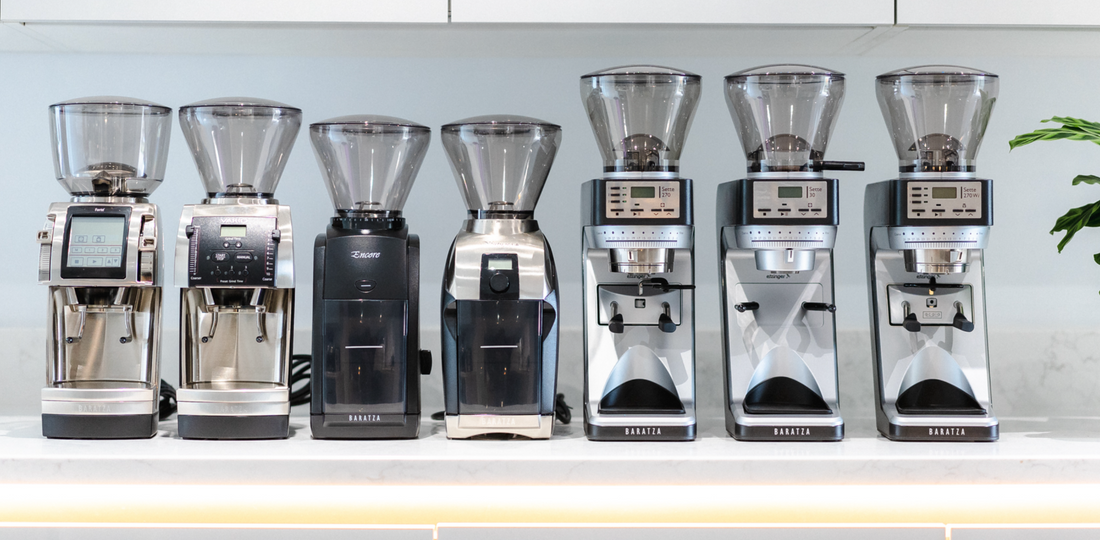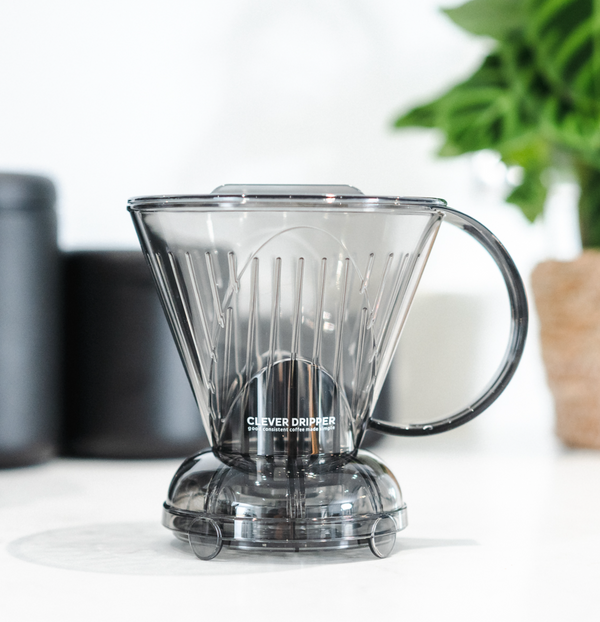
Grinder Comparison - Flat Burr vs. Conical Burr Coffee.
In this article we’ll explore what grinder burrs are, the pros and cons to each, and what style is best suited to your needs. A grinder can often be overlooked by people new to the home coffee world, but really it should be viewed as a key piece of the puzzle, shaping each cup.
What are Burrs?
Firstly, lets start by defining what burrs actually are. Grinder burrs are sharp, rotating components, inside a coffee grinder. They are the part of the grinder that crushes coffee beans into particles ready for brewing.
They come in two main types; flat and conical. So lets go ahead and compare the two:
Flat Burr Grinders:
A flat burr coffee grinder employs two flat, parallel metal disks (known as burrs) with sharp edges that rotate against each other. Coffee beans are fed into the grinder's hopper. From there, they pass between the burrs, and are crushed to the desired particle size. The distance between the burrs can be adjusted to control the fineness or coarseness of the coffee grounds. Flat burr grinders are known for producing a uniform grind size, which is essential for achieving consistent extraction and flavour in various coffee brewing methods.
Best Uses:
Flat burr grinders excel at producing uniform particle sizes, making them a top choice for pretty much every style of coffee! A good motor with flat burrs should be able to grind from finely ground, e.g. espresso, through to coarsely ground, e.g. filter. This consistent grind size allows for better extraction, ensuring a well-balanced cup of coffee. It’s worth noting that some home focused flat burr grinders do not have a large enough motor to grind fine enough for espresso, so be wary of that.
Price Range:
Flat burr grinders often fall into the mid to high price range due to their precision engineering. Expect to invest anywhere from £255 to £919, depending on the brand and features.
Pros:
- Consistency: The flat burr design produces a uniform grind size, crucial for achieving even extraction.
- Espresso excellence: Ideal for espresso machines, as the consistent grind contributes to a perfect shot*
*If the motor can handle grinding fine for espresso
Cons:
- Price: These grinders tend to be pricier due to their precision and performance and generally larger motors.
- Retains coffee: Some flat burr grinders with burrs mounted horizontally may retain a fair amount of coffee.
Conical Burr Grinders:
A conical burr coffee grinder, unlike flat burr grinders, uses two cone-shaped burrs. One stationary and one rotating, to crush and grind the coffee beans. The beans are fed into the grinder's hopper and pass through the gap between the two conical burrs, resulting in a uniform grind size. Conical burr grinders are appreciated for their ability to generate less heat during the grinding process, which can help preserve the flavour and aroma of the coffee beans. They are also known for their durability and versatility, making them a popular choice among coffee enthusiasts.
Best Uses:
Conical burr grinders are versatile workhorses, suitable for a wide range of brewing methods. They are great for almost anything from a french press through to espresso, making them an excellent choice for those who like to experiment with different brew styles. They’re also able to grind fine, e.g. espresso, with less torque and therefore a smaller motor can be used compared to flat burr grinders. This means that entry level conical grinders are usually cheaper than a flat burr grinder, that is capable of grinding for espresso.
It’s also worth noting that almost every single hand grinder on the market is a conical grinder. The reason for this is because a flat burr grinder needs a larger amount of torque to get started, which can make for quite the work out when making your morning coffee!
Price Range:
Conical burr grinders generally span the mid-range in terms of pricing. Expect to spend around £169 to £619, offering a balance between performance and affordability. Hand grinders range from £60-250.
Pros:
- Versatility: Not needing as much torque means that most conical grinders can grind coffee for any brew method.
- Less Noise: They tend to produce less noise compared to flat burr grinders.
- Affordability: Conical burr grinders strike a good balance between performance and price.
Cons:
- Grind Consistency: While conical burr grinders are still precise, they might produce slightly less uniform grounds compared to flat burr grinders.
- Less Heat: The burrs are likely to be less hot than flat burrs under the same use, potentially having a positive impact on the flavour profile of the coffee.
Decision time:
When it comes to the ultimate showdown between flat burr and conical burr grinders, the choice depends on your brewing preferences and priorities:
- Flat Burr Grinders: If you're a coffee aficionado seeking precision and consistency for your shots / brews, and you're willing to invest in quality, a flat burr grinder is your weapon of choice- Make sure if espresso is on the menu, to buy a grinder that is desinged to grind fine enough for espresso!
- Conical Burr Grinders: If you enjoy experimenting with different brewing methods and want a versatile grinder that won't break the bank, conical burr grinders offer a balanced approach.
Coffee grinding is a crucial step on the path to brewing perfection. If you just brew filter coffee at home, or you have an espresso machine, you now know what type of grinder will best suit your needs. Whether you opt for the precision of a flat burrs or the versatility of a conical burrs, remember to choose wisely as your grinder is the backbone of all the coffee you make!











